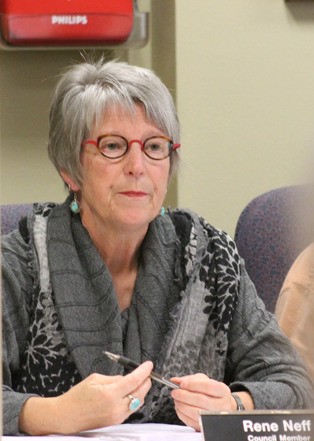Langley Lift, the Dog House Tavern renovation, First Street condominiums: all of these are big ideas that would redefine Langley’s look and character and continue to be hot topics for city leaders.
All three were discussed at length separately and, at times, as a whole during Monday’s city council meeting. Council members were encouraged by the vociferousness of people opposed to the Langley Lift, a bridge and elevator connecting the marina to Cascade Avenue, during a recent Planning Advisory Board meeting. They were, however, nonplussed with citizens’ understanding or lack thereof with regard to the timeline of moving forward with a city-financed project that large.
“Everybody needs to rest a bit,” said Councilman Bruce Allen during the public comment section.
The city was prompted into the discussion after Callahan McVay, a Langley business owner and member of the city’s Arts Commission, said he fully supported the Langley Lift. He countered criticism that the view would be ruined, noting that the mechanism would be well up Cascade Avenue and close to trees.
“The entire rest of the bluff is going to be completely unobstructed,” McVay said.
He also said getting people up the hill, now only accessible to pedestrians via Wharf Street’s steep sidewalk, was important for business and tourism. As a member of the Langley Main Street Association, which runs an electric golf cart to loop people around the downtown shopping area including South Whidbey Harbor’s marina, McVay said they needed 1,000 volunteer hours to staff the cart. They were well short.
“It’s not just Langley it’ll be supporting, it’s all of South Whidbey,” he said.
One of the first items on the city council’s agenda included a rejection of the Langley Lift by the city’s Parks and Open Space Commission, which gave its semi-annual report, courtesy of Marianne Edain. She opened by reading a letter formally opposing the project. She cited concerns that it may conflict with Langley’s Shoreline Master Program, the guiding shoreline document for development.
“We feel there are a great many questions about this … The current proposal would certainly impact views, in fact the most iconic view,” Edain said.
The city council took the testimony but did not take action; the Langley Lift remains a project under consideration.
Renovation revisited
Renovating the Dog House Tavern appears to be on the table again. Director of Community Planning Jeff Arango presented the city’s ordinance for the demolition of historic buildings for a first reading by the city council after five months of work. The ordinance sets out guidelines to prevent “demolition by neglect” and encouragement for renovation of at least superficial features such as facades.
In April, the Dog House’s owners asked the city about the demolition process. That prompted an emergency moratorium on demolition applications for buildings on the National Historic Register. Only one building is on that list in Langley: The Dog House Tavern, formerly called the Olympic Club. The relationship between the owners, Charlie and Janice Kleiner, and the city deteriorated. Mayor Fred McCarthy, however, has apparently salvaged it and brought them back to examining renovation rather than demolition.
One of the sticking points was that the Kleiners felt they needed to own property along Anthes Avenue that runs next to their property and under the stairs. The city offered to let them use it as an easement, but not own it, or do a land swap for the property closest to the waterfront and adjacent to Seawall Park. Langley is not allowed to give away public lands without a fair value trade, or it would be a gift of public funds.
Some of the development standards included in the ordinance drew the ire of Leanne Finley, a real estate agent who represented the owner of the vacant Edgecliff Restaurant building and the building that houses the Village Pizzeria. Finley criticized the inclusion of 5-foot setbacks for each floor, saying it would not allow for owner Richard Francisco or other First Street bluff-side property owners to redevelop their land into parking space for condominiums.
“If you can’t really build, he’s not going to build,” she said.
That was countered by Councilman Jim Sundberg, who said the lots, generally 30 feet wide and at least 80 feet deep, were substantial enough to provide on-site parking for mixed-use accommodations.



